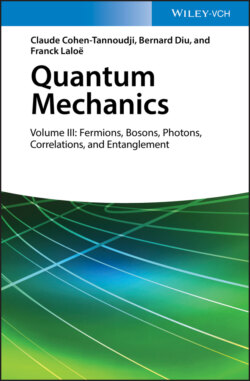Читать книгу Quantum Mechanics, Volume 3 - Claude Cohen-Tannoudji - Страница 136
Complement FXV Fermions, time-dependent Hartree-Fock approximation
Оглавление1 1 Variational ket and notation
2 2 Variational method 2-a Definition of a functional 2-b Stationarity 2-c Particular case of a time-independent Hamiltonian
3 3 Computing the optimizer 3-a Average energy 3-b Hartree-Fock potential 3-c Time derivative 3-d Functional value
4 4 Equations of motion 4-a Time-dependent Hartree-Fock equations 4-b Particles in a single spin state 4-c Discussion
The Hartree-Fock mean field method was introduced in Complement EXV for a time-independent problem: the search for the stationary states of a system of interacting fermions (the search for its thermal equilibrium will be discussed in Complement GXV. In this complement, we show how this method can be used for time-dependent problems. We start, in § 1, by including a time dependence in the Hartree-Fock variational ket (time-dependent Fock state). We then introduce in § 2 a general variational principle that can be used for solving the time-dependent Schrödinger equation. We then compute, in § 3, the function to be optimized for a Fock state; the same mean field operator as the one introduced in Complement EXV will here again play a very useful role. Finally, the time-dependent Hartree-Fock equations will be obtained and discussed in § 4. More details on the Hartree-Fock methods in general can be found, for example, in Chapter 7 of reference [5], and especially in its Chapter 9 for time-dependent problems.
